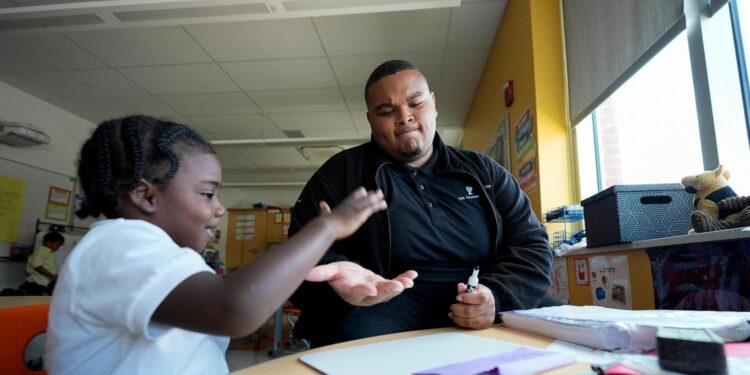Oct 18, 2024 Story by: Editor
BALTIMORE — Before 19-year-old Davontez Johnson took on the role of an instructor in a preschool classroom at Dorothy I. Heights Elementary, he was a senior at a nearby high school, grappling with uncertainty about his future, much like many young adults. Never in his wildest dreams did he envision himself on a vibrant carpet, leading a group of 4-year-olds in a lively chant and dance focused on phonics.
“Words have parts — that’s syl-a-bles,” he articulated clearly, prompting the preschoolers to respond. “Clap your hands now, syl-a-bles! Stomp your feet now, syl-a-bles!”
Johnson is a participant in the Leading Men Fellowship, a program dedicated to training young Black and Latino men as early literacy instructors in preschool settings across the nation. The initiative addresses multiple issues: the shortage of early educators, the lack of Black and Latino male teachers, and the unique challenges that boys of color encounter in the educational system due to their race and gender.
“We’re not only affecting change in the classroom with these school students, but (we’re) also developing these young future educators,” Ivan Douglas from the Literacy Lab, which administers the Leading Men Fellowship, stated.
Many fellows, including Johnson, are recruited directly from high school. After undergoing a rigorous interview and an intensive summer training program, they begin their teaching roles, often as one of the few male educators in the environment. Their hourly wages range from $16.50 to $18.
Having previously played as an offensive lineman in high school, Johnson understands that some parents might find his presence in a preschool classroom surprising. The statistics support this perspective: according to federal data, fewer than 1% of elementary and early education public school teachers are Black men. However, this reality is part of what motivated him to join the program.
“I really thought it was a great opportunity. Because I know if I saw someone like me, you know, in pre-K, I’d be pretty excited,” Johnson reflected. “You don’t see a lot of young Black males.”
Research indicates that Black male students face discrimination even before entering kindergarten, with higher rates of suspension and expulsion from preschool, despite evidence showing they do not misbehave more than their white counterparts. Additionally, boys are statistically more likely than girls to be expelled.
However, studies increasingly demonstrate that Black teachers can significantly benefit Black students, particularly Black boys. Since the Leading Men Fellowship’s establishment in 2016, research has consistently shown that students of color perform better when taught by educators who share their racial background.
Nicholas Papageorge, an economist at Johns Hopkins University, has explored the effects of Black teachers on Black students. His findings reveal that Black teachers hold higher expectations for Black students compared to their non-Black counterparts.
“If a Black student had a white teacher and a Black teacher, that white teacher had systematically lower expectations,” Papageorge explained.
Further research by Papageorge indicates that Black students with Black teachers are less likely to drop out of high school and more inclined to pursue higher education, with the most significant impact observed among Black boys from low-income families.
Through his studies, Johnson has acquired a deep understanding of early education, discovering that it involves considerable singing and dancing—activities not commonly associated with a traditional teaching role. Children learn best through repetition and when information is paired with movement and music.
Bridget Jeffrys, the preschool teacher who supervises Johnson, mentioned that he was the first male educator she had ever collaborated with until he joined her class at the beginning of the last school year. She has witnessed Johnson’s confidence blossom as he engages with her students, transforming from a reserved figure to an enthusiastic leader. Although Jeffrys believes Johnson’s voice and dance moves could use improvement, his heartfelt performance makes a positive impression.
“It was so beautiful because usually you don’t see men really get down to the child level,” Jeffrys said. “That excited them even more. A lot of kids think he’s a big kid.”
In addition to teaching at Heights Elementary, Johnson is pursuing a degree in political science at the University of Maryland Global Campus, aspiring to enter politics. Nevertheless, his colleagues are encouraging him to remain in education.
While his primary responsibility is to provide targeted literacy instruction, Johnson has fully integrated himself into the daily activities of the school. In his second week, he sang the morning greeting song in a robot voice. When students fidget during story time or wander off, he is there to guide them back.
On a recent October day, Johnson helped students practice writing their names. Though he had been with this group for only a couple of weeks, many children were drawn to him. During free-play time, he praised a girl working on a crayon rubbing of a leaf.
“You’ve done a wonderful job,” he complimented her, as she looked up at him, seeking validation. Another student interrupted him by handing over a handful of play money.
After lunchtime, as most preschoolers sat on the carpet engrossed in a story read by Jeffrys, 4-year-old Kodi Hendricks wandered toward the door and peered into the hallway until Johnson motioned for him to return. Johnson knelt down to tie the boy’s shoe, and then they sat together for a penmanship lesson.
“What’s the first letter?” he asked Kodi.
“K,” he answered. Johnson demonstrated, in exaggerated motion, how to write the letter K.
“No, I can’t do it,” Kodi said, discouraged.
“It’s all right,” Johnson reassured him, encouraging perseverance.
“You can do it. It just takes practice.” Source: ABC News

















